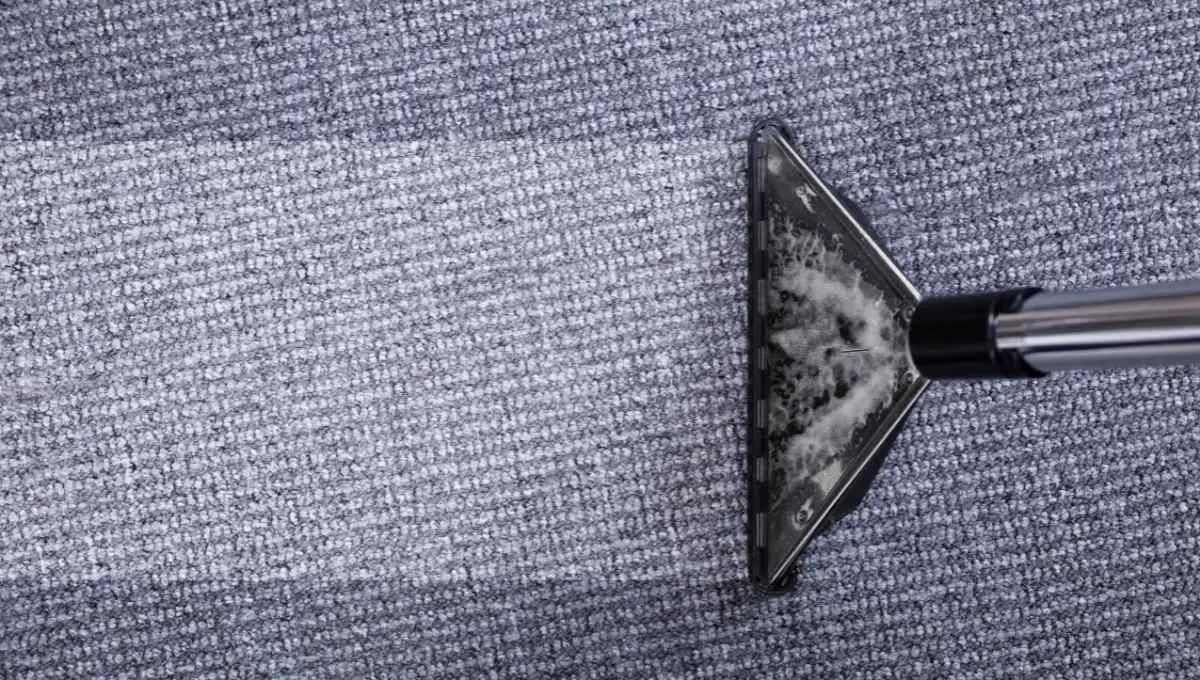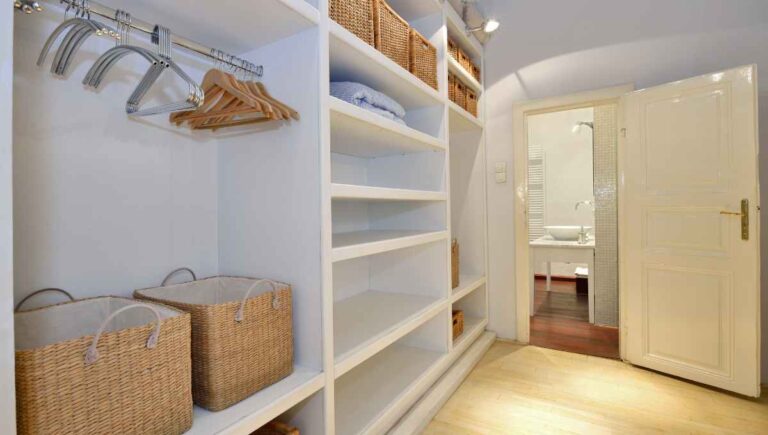Wet Carpet in Closet? (What This Means and How to Fix It)

Finding a wet carpet in your closet can be a frustrating and confusing experience. Not only is it unpleasant to step on, but it can also cause damage to the carpet and surrounding areas. What could be causing this?
A wet carpet in your closet probably indicates a water leak. This can be either caused by faulty plumbing or a foundation leak, which a qualified plumber can diagnose. A wet carpet should be dried as soon as possible to prevent mold growth.
No matter the cause, a wet carpet should be dried as soon as possible to prevent any further mold problems. This article will determine the cause of a wet carpet in your closet and how you can dry the carpet.
This post contains affiliate links. This means Household Blogger may earn a commission should you make a purchase using any of our links. Please refer to our full affiliate disclosure policy for full details.
Here’s a Quick Pro Tip!
Once you have determined the cause of the wet carpet in your closet, you immediately need to dry the carpet. A wet carpet attracts mold, which could have serious health repercussions for your family.
Here are our favorite products from Amazon to dry your carpet
1. Stanley wet/dry Vacuum Cleaner – Perfect for quickly removing still-standing water from your carpet.
2. Dehumidifier – Ideal for removing the moisture from the air in your closet.
3. Baking Soda – A natural alternative product to remove moisture from your carpet.
Wet Carpet In My Closet
There could be various reasons for a wet carpet in your closet. You should consider the adjacent rooms and if your closet walls hold many pipes. Here are the possible causes for your wet carpet.
Why Is the Carpet in My Closet Wet?
A wet carpet in your closet could indicate a leak in your plumbing, depending on which pipes run underneath your closet. If you’re unsure, a plumber would be able to diagnose a leak and repair the issue.
Until you find the source of the wetness, turn off the water supply to your home. In some homes, the water supply is found in the pantry. After the leak or issue in your plumbing is repaired by a plumber, you can turn the water supply on again.
Why Is Water Seeping Through My Carpet?
Water seeping through your carpet usually indicates one of two problems. The first is that you might have a foundation leak, and the second is a probable leaky pipe. Each has its own frustrations.
A foundation leak should be stopped and fixed as quickly as possible since it can cause much damage throughout your house. Luckily, a qualified plumber would be able to identify a foundation leak or a pipe/plumbing leak.
Why Is Water Leaking in My Closet?
Closet water leaks are always caused by something outside of the closet. This could be a foundation leak or pipe leak under the floor, or even pipe damage in the walls. This is a likely scenario if your closet is adjacent to a laundry room or bathroom.
When you notice a water leak in your closet, you should immediately turn off the main water supply to dry up your pipes, as this should stop the worst water damage. Contact a local qualified plumber to assess your damage and leak as soon as possible.
Why Is My Closet Floor Wet With No Leak?
If you’ve ruled out the possibility of a plumbing leak, but your closet floor is still wet, you might have a foundation leak. This occurs when the concrete foundation of your house develops a crack, and water is allowed to seep through.
The soil underneath your house constantly shifts due to heavy rain or other environmental factors, however, this shifting soil can cause the foundation to shift as well. The foundation will eventually crack and might even damage water pipes in the vicinity.
How Long Can Carpet Stay Wet?
A carpet should not stay wet for any extended period of time, although if you can dry it up within 48 hours, it should be safe. Leaving your carpet wet for a longer period will encourage mold and mildew to grow.
It’s vital to dry your carpet as soon as possible. You could use a wet/dry vacuum cleaner to remove the water from your carpet. Most importantly, you should investigate the cause of the water and fix it.
Can Condensation Make a Carpet Wet?
Typically, condensation is not enough to wet a carpet, however, it can be a contributing factor. If you notice a wet patch on your closet carpet and you live in a particularly humid climate, condensation might be partly to blame.
You can use a dehumidifier to extract the moisture from the air of your closet. This would not be necessary if you do not live in a climate with exceedingly high humidity. In any other circumstance, condensation alone would not be enough to make your carpet wet.
Drying a Carpet
When you’ve discovered the cause for the moisture and seen that it gets fixed, you need to jump to drying your carpet. A carpet should not just be left to sit and dry up by itself, since this will likely cause mold to grow.
How Do You Get Damp Out of Carpet?
The easiest way to extract moisture from a damp carpet is to sprinkle a generous amount of baking soda over the wet spot. Baking soda is known to absorb moisture and any other ‘unpleasant’ smells.
Sprinkle the baking soda over your carpet at night and leave it until the next morning, this should be enough time to extract any moisture. The next morning you can use a vacuum cleaner to clean up the baking soda.
Will a Dehumidifier Dry a Carpet?
A dehumidifier alone might struggle to remove the moisture from a carpet within 48 hours, however, pairing a dehumidifier with a fan might do the trick. If your closet has a ventilation fan, turn it on as well.
The proper airflow, paired with a dehumidifier, will speed up the drying time of your wet carpet. Open any windows or doors your closet has and any adjacent rooms as well. You would want to increase the fresh air flowing through the closet.
Does Rice Soak up Water From a Carpet?
Rice is known for its absorbent qualities and can be used to soak up water from a carpet. However, it’s not the first or best option available.
You should first grab towels to absorb any still-standing water or excess moisture. Then you can grab the baking soda to extract the last bits of moisture. However, if you don’t have baking soda on hand, rice might do the trick.
Is Heat or AC Better to Dry Carpet?
Warm, dry air is the best combination to dry your carpet. It would be better to turn up the heat when you’re drying your carpet. You should also use a dehumidifier to remove the moisture from the air for an even quicker drying time.
Turn up the heat, or use a portable heater in the room, paired with a dehumidifier and a ventilation fan. This should dry your carpet within hours (depending on how damp/wet your carpet is).
Can Wet Carpets Be Saved?
If you can remove all the moisture from a carpet within 48 hours and you’re 100% sure it was clean water, your carpet can probably be cleaned and saved. However, if your carpet is soaked in sewage or other dirty water, it’s best to replace it.
The same sentiment goes for a carpet that was wet for more than 48 hours. Even if you were to get it completely dry again, the carpet probably already attracted mold to grow underneath it. You won’t notice the effects immediately, but after a while, you might notice strange smells and carpet discoloration.
Does Baking Soda Absorb Moisture From Carpet?
Baking soda does absorb moisture from a carpet and can effectively dry your carpet, even though It is not the best option in all situations. Baking soda won’t be able to dry up still-standing water.
If you’ve removed most of the water, sprinkle a generous amount of baking soda over your damp carpet. Leave the baking soda to sit over your carpet overnight, and use a normal vacuum cleaner to clean it up the next morning.
You might also enjoy our post on Whether You Can Vacuum a Wet Carpet
Mold Concerns For Wet Carpets
So we’ve considered the best and fastest way to dry your carpet. This is so critical because of mold growth, specifically mold growth underneath your wet carpet. Let’s look at why mold growing under your carpet could be disastrous
How Long Does It Take for Mold to Grow in Wet Carpet?
Mold and mildew can start to grow on damp or wet surfaces within 24 to 48 hours. So, if your carpet has been wet for longer than 48 hours, it’s safe to assume that you’ll have a mold issue.
Mold exposure could have some serious health risks for people living in the house, including respiratory problems, eye and skin irritation, and sinus congestion. If your carpet has been wet for any period of time, it’s best to have it professionally cleaned.
Do I Have Mold Under My Carpet?
Initially, you probably won’t be aware of mold under your carpet, since there are no immediate signs. However, over time, you might notice black or dark green spots on your carpet.
This should be your first sign of trouble, while another popular indication of mold is a strange or unusual smell emitting from your carpet. Mold has a specific musty smell, and if you’ve dealt with mold before, you’ll probably recognize the smell immediately.
What Does Carpet Mold Smell Like?
Mold has a specific smell that most people describe as ‘musty’ or ‘stale’. It can also smell earthy, similar to rotten vegetables, so it’s certainly not described as a pleasant smell. Usually, the smell is the first indication of mold growing underneath your carpet.
If you start to smell the mold, it has probably been growing for a while. You should immediately contact a professional carpet cleaning company to deep clean your carpet and hopefully remove all traces of mold.
How Do You Check for Mold Under a Carpet?
If your carpet is freestanding – like a rug – you can lift the rug up and inspect the underside for signs of mold. For a carpet that is installed, you can’t check underneath without lifting up a piece of the carpet.
If you’ve been smelling mold and see discoloration, it could be enough validation to lift up your carpet. If you see mold, it can be dealt with, however, if you don’t, your carpet would need to be reinstalled by professionals.
Will Wet Carpet Grow Mold?
Moisture attracts mold, so if your carpet is wet and you cannot dry it quickly enough, it will probably attract mold. Experts say that if you can dry your carpet within 24 hours, you minimize the chances of mold.
No matter the length of time, if your carpet gets wet, it has a chance of attracting mold. Mold can have some pretty serious health hazards for people living in the house, so you would need to check for mold and get rid of it as soon as possible with a dehumidifier or wet/dry vacuum.
Can You Get Sick From Moldy Carpet?
A moldy carpet could hold serious health concerns for you or for someone in your household. Respiratory problems are often related to mold exposure, especially for someone who already has a respiratory condition.
Mold also often causes allergic reactions like nasal, eye, or throat irritation. Long-term mold exposure could also have adverse health effects. If you have a moldy carpet, it should be replaced as soon as possible.
You might also enjoy our post on Whether You Can Put Furniture On a Wet Carpet
Related Questions
What Kills Mold in Carpet?
You can use a mixture of baking soda and white vinegar to remove mold from your carpet. This will do the trick for small patches of mold. Sprinkle baking soda over the mold and pour vinegar over the powder.
The mixture will start to fizz, don’t panic. You can use a stiff brush to remove any mold spores that you see from the carpet and scrub in the general area. You should also have your carpet professionally cleaned to eliminate all traces of mold.
Will Wet Carpet Smell Go Away?
The wet carpet smell does not come from the moisture itself, it indicates that mold is growing underneath your carpet. So the smell will not go away until you fix the causing issue; the mold.
Improve the airflow in the room by opening windows and doors. You should either clean the mold yourself/have the carpet professionally cleaned, or replace the whole carpet altogether. This is the only way to eliminate the ‘wet carpet smell.’
What Are Signs of Mold Exposure?
The symptoms of mold exposure include, but are not limited to, a stuffy nose, itchy eyes/nose, or coughing. Mold might affect some more than others, although it is overall not healthy for humans.
The CDC has shown research that links early mold exposure to the development of asthma in children. Exposure to large amounts of mold could have a more severe reaction than simple allergy symptoms.
Final Thoughts
As soon as you notice a wet spot on your carpet, immediately shut off the water supply to the house. Contact a plumber to come out and assess the cause of the leak and then immediately get to drying your carpet.







